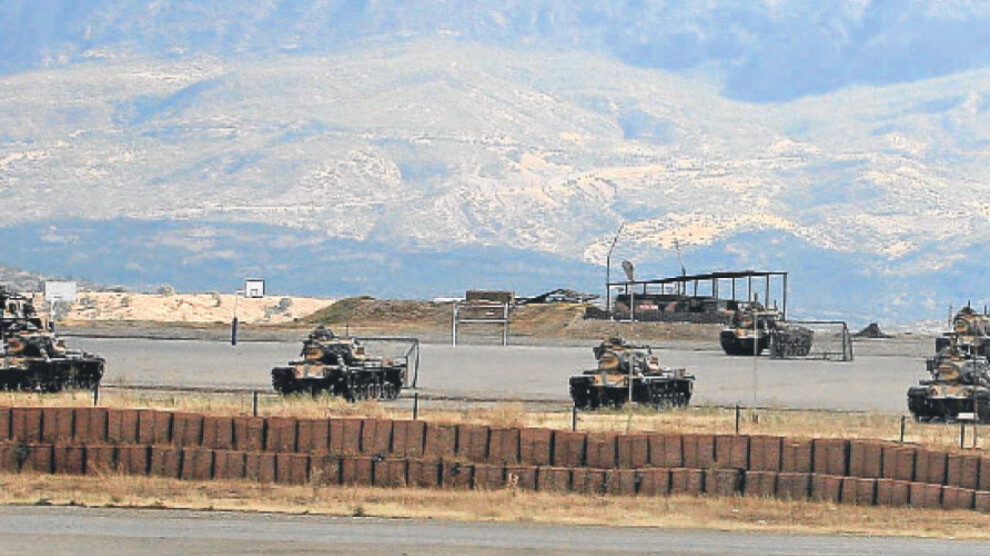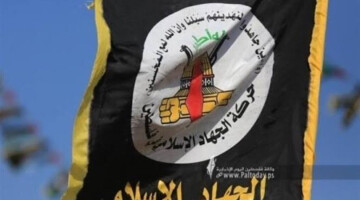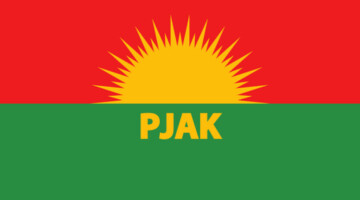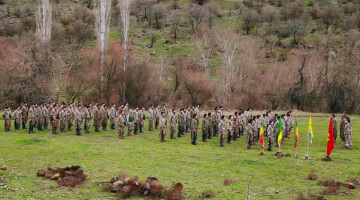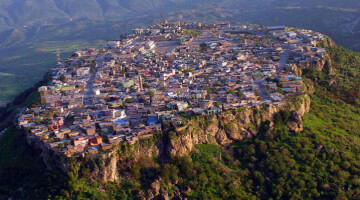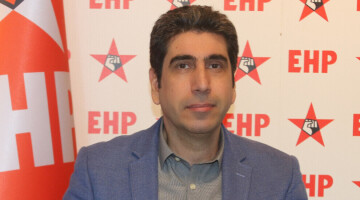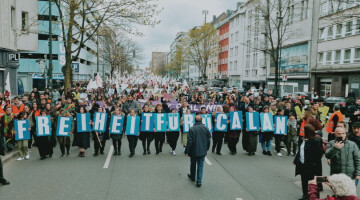The heavy war between the Kurdish people and the Turkish state is ongoing in northern Kurdistan (southeast Turkey) as well as in Rojava and southern Kurdistan (northern Iraq).
Due to the accelerated war preparations in the region, the south of Kurdistan has increasingly come into focus in recent days. What began with the occupation of the strategically important region of Zînê Wêrte by military forces of the KDP (Kurdistan Democratic Party) and continued with further troop deployments in the southern Kurdish regions of Heftanîn, Xinêre, Goşîne and Helgûrt, is now being pushed forward with the encirclement of the Gare region. All of these are clearly steps in preparation for a new war in South Kurdistan.
Murat Karayılan, a member of the Executive Council of the Kurdistan Workers' Party (PKK), commented on the current developments in an interview with SterkTV on October 26th. Regarding the KDP's recent moves, he said: “They are preparing a new war. They want to station their own forces, wherever one of our positions is located. With their military posts, they aim to break the lines of communication between our positions. Does Mr. Barzani (Mesut Barzani, former President of South Kurdistan, currently KDP Chairman) know about these developments? We wonder what his opinion is about this. We want him to take care of these matters. At the same time we are ready to solve the existing problems through dialogue with each another. Personally, I do not have the slightest desire to order the guerrilla to attack Kurds. Neither I nor our movement would like that. We hope that our counterparts understand this too. Please! We fight the enemy every day and we are not afraid of war. But we don't want an inner Kurdish war."
Mesut Barzani responded to Karayilan's statement on November 2nd: “Our decision to ban an intra-Kurdish war was misunderstood. It is used to destroy security, stability and tranquility in cities and villages. We cannot be expected to stand still in the face of such an attitude. The heroic Peshmerga (official security forces of the Kurdistan Autonomous Region) fought against the brutal attacks by IS and cleared many regions of these terrorists. But unfortunately the PKK has occupied some vacated areas instead of supporting the progress of the Kurdistan Autonomous Region. The PKK prevented the population from returning to their hometowns and from rebuilding their homes. At this stage, the most appropriate stance is to recognize the authority of the government in the Kurdistan Autonomous Region and to withdraw from these areas that were occupied through the use of force. These areas represent a great danger for the people of Kurdistan."
It is not necessary to go into detail about the content of the two statements and the words used in them. In his statement, Mesut Barzani rejected the appeal by Murat Karayılan, who had previously called on all Kurdish parties to take joint action against the occupation by the Turkish state. He responded to the PKK's call for talks, dialogue and negotiations with a declaration of war. Barzani's most recent statement is at the same time a rejection of the promise he made in the past, `as long as I am alive, I will not allow a war between Kurds'.
With his declaration of November 2, Mesut Barzani tries to give the impression that the PKK has only settled in southern Kurdistan in recent years and is attacking the rule of the KDP. Yet, the PKK came to the mountains of Kurdistan as early as 1981, at a time when southern Kurdistan was still under the control of the Iraqi central government. Just as the Peshmerga of the KDP and PUK (Patriotic Union of Kurdistan) settled in these areas at that time, the PKK guerrillas also set up camp there. Additionally, in 1982 an agreement was signed between the PKK and the KDP, in which friendly relations, mutual aid and national unity were evoked. Can the KDP and Barzani deny this agreement today?
When IS seized the cities of Kirkuk and Mosul within a few days in the summer of 2014 and stood at the gates of the important city of Erbil, the rich families in the region began to flee to Jordan, Kuwait and Lebanon. It was Mesut Barzani personally who asked the PKK for help at the time. The PKK then sent its guerrilla forces to the southern Kurdish cities of Erbil, Kirkuk and Maxmur in cars provided by the KDP. After the guerrillas had defeated IS in all these places, they withdrew to their original areas. As a response Barzani personally thanked the guerrillas and the PKK for their help. When hopelessness in the face of the IS attacks raged, the HPG guerrillas rushed in in long car convoys and took up positions in places like Kirkuk and Erbil. The videos recorded at the time still testify to the great joy with which the population met the guerrillas. Mesut Barzani's visit to Maxmur, during which he expressed his gratitude to the guerrilla commanders stationed there, was also documented on video [1].
So what is the difference between today's PKK and the PKK, which the KDP and Barzani asked for help during the IS attacks of that time? How do fraternity and political ethics go with deceiving and cheating to get help in difficult times? And in which villages and towns has the PKK settled that had previously been liberated from IS by the KDP-Peshmerga?
While Mesut Barzani emphasizes that the only solution is for the PKK to “withdraw from the areas it occupies”, he does not consider the occupation of southern Kurdistan by the Turkish army a problem. He does not see it as problematic that the KDP leadership has allowed the Turkish state to build 40 military stations on southern Kurdish soil over the last two years, to expand its occupation and to establish control over certain areas. But the presence of a Kurdish party like the PKK in southern Kurdistan poses a threat to Barzani.
The journalist Doğan Çetin recently wrote: “The KDP sees the current plan as a realistic option to crush the PKK, has an important supporter behind it and regards the implementation of the plan as its only available option. If this were not the case, the KDP would never behave as fearlessly and courageously as she currently does. This illustrates the extent of the danger and the explosiveness of the current plan.” The plan that Çetin speaks of is a work drawn up by the - now former - American special envoy for Syria and Iraq, James Jeffrey, together with Turkey. Its aim is to crush the PKK. The implementation of this plan began with the occupation of the northern Syrian regions around Afrin, Serêkaniye and Girê Spî in 2018 and 2019. And it continues by the current attempts to use the ENKS (Kurdish National Council) to get a place for the KDP in Rojava`s leadership. In addition, there is pressure on the southern Kurdish regions of Shengal and Maxmur, whose current self-government status is to be dissolved and replaced by submission to KDP control.
The overwhelming majority of the Kurdish population in all four parts of Kurdistan is against this plan, in which the KDP is actively involved. The Kurds know that the war that is currently being prepared is not a 'war between brothers', but nothing else than a war by the Turkish state against the Kurdish population. The KDP is currently frightened and is frantically trying to disguise its alliance with the Turkish state. But the facts are clear: the Turkish state is waging a comprehensive war against the Kurds. And in this war the KDP is not on the side of its own people, but stands side by side with Turkey.
[1] https://www.youtube.com/watch?v=r5kV7P7Nmks
Source: Yeni Özgür Politika

